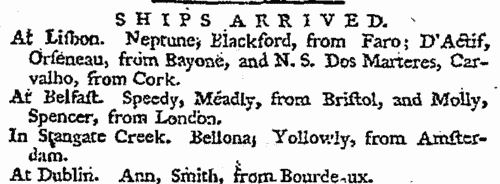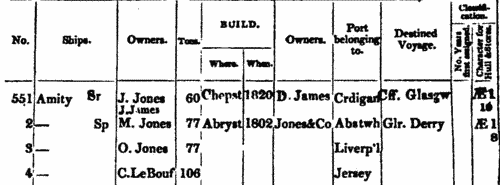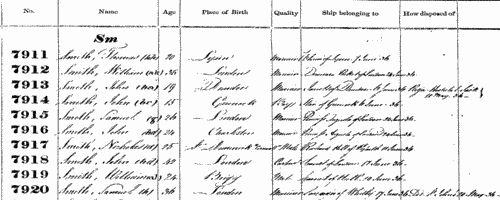Mcdowal Surname Ancestry ResultsOur indexes 1000-1999 include entries for the spelling 'mcdowal'. In the period you have requested, we have the following 14 records (displaying 1 to 10): Buy all | | | Get all 14 records to view, to save and print for £94.00 |
These sample scans are from the original record. You will get scans of the full pages or articles where the surname you searched for has been found. Your web browser may prevent the sample windows from opening; in this case please change your browser settings to allow pop-up windows from this site. Home family archives
(1424-1671)
William Fraser of the Historical Manuscripts Commission examined the archives of the Earl of Home at Hirsel (near Coldstream in Berwickshire), and prepared this calendar, published in 1891.The most detailed account is of 'Documents, more or less of a Personal Nature relating to the Principal Members of the Family of Home' (pp. 87-107), and 'Old Charters and other Documents still in the Charter Chest at Hirsel, relating to Lands formerly possessed by the family' (107-170), with deeds relating to Auldcambus, Aldcathy, Arbirlot, Bedshiel, Bogend, Braidley, Brigham, Brighamshiels, Chirnside, Coldingham, Cowdenknowes, Crailing, Dalswinton, Derington, Dunglas, Eccles priory, Eltrive, Eskdale, Ewesdale, Fogo, Gordon, Greenlaw, Greenwood, Haddington, Harden, Hassington, Hassendean and Horsliehill, Hoscoat, Howlaws, Howpasley, Huntlywood, Jedburgh, Lambden, Lauder, Letham, Leyacres, Luchheild (in Fife), Mawdristoun (Manderston), Maw (in Fife), Mawes (in Perthshire), Mellerstain, East Nisbet, Samuelston, Smailholm, Sprouston, St Bothans (St Bathan), Swynset, Thornton, Tinneis (in Yarrow), and Upsetlington. Fraser was then allowed to inspect the family charters held by their law agent in Edinburgh in nine charter chests, and gives abstracts of the early items that he considered important. This volume also contains his calendar of some of the muniments of the Duke of Athole at Blair Castle, Blair Athole, concentrating on family correspondence from 1473 to 1721: this is also included in this index.MCDOWAL. Cost: £4.00.  | Sample scan, click to enlarge

| Masters of Merchantmen
(1785)
The Daily Universal Register of April 1785 includes a section entitled Ship News. This is compiled from reports from Portsmouth, Deal, Plymouth, Whitby, Cowes, Falmouth, Bristol and Gravesend as to merchant shipping movements; news of losses and sightings coming in from various ports; a list of Ships Arrived in the (London) River, in the Clyde, in the Creek(e), in the Downs, off the Lizard, off Scilly, off the Start, in Studland Bay, off Whitby, off the Wight, at Aberdeen, Alicante, Ancona, Antigua, Baltimore, Barbadoes, Barcelona, Bayonne, Belfast, Bombay, Bonny, Bordeaux, Brighthelmstone (Brighton), Bristol, Cadiz, Carlingford, Cartagena, Charlestown, Cork, Cowes, Cuxhaven, Dartmouth, Dominica, Dover, Dublin, Dunkirk, Falmouth, Galway, Gibraltar, Grenada, Guernsey, Halifax (Nova Scotia), Hamburg, Havre de Grace, Hull, Jersey, Kinsale, Lancaster, Leghorn, Limerick, Lisbon, Liverpool, Londonderry, Lochryan, Malaga, Marseilles, Montserrat, Nantes, New Providence (Bahamas), New York, Newry, Oporto, Ostend, Penzance, Plymouth, Poole, Portsmouth, Rotterdam, St Eustatia, St John's, St Kitts, St Vincents, Scarborough, Scilly, Seville, Southampton, Stangate Creek, Tenerife, Texel, Tobago, Venice, Waterford, Weymouth, Whitehaven, and in 'Africa', Georgia, Jamaica, Maryland, North Carolina, Philadelphia, South Carolina and Virginia; and Coast Lists made at the Custom House in London. Except in the home ports, the register refers only to British shipping: each ship is usually identified merely by its name, and the master's surname, although masters' christian names are given occasionally. Naval vessels are mentioned rarely, and their captains' names not usually stated. MCDOWAL. Cost: £6.00.  | Sample scan, click to enlarge

| Masters of Merchantmen
(1785)
The Daily Universal Register of February 1785 includes a section entitled Ship News. This is compiled from reports from Portsmouth, Deal, Milford, Poole, Standgate Creek and Gravesend as to merchant shipping movements; news of losses and sightings coming in from various ports; a list of Ships Arrived in the (London) River, in the Clyde, in the Downs, off Beachy Head, off Dover, off Poole, at Alicante, Amsterdam, Ancona, Baltimore, Barbadoes, Belfast, Bilbao, Bordeaux, Boston (New England), Bristol, Bryar, Cadiz, Campvere, Charlestown, Cork, Cowes, Creek, Cuxhaven, Dartmouth, Dominica, Dover, Dublin, Dunkirk, Falmouth, Faro, Gibraltar, Glendore, Grenada, Halifax (Nova Scotia), Havre de Grace, Helvoetsluys, Hull, Kinsale, Lancaster, Leghorn, Leith, Lisbon, Liverpool, Londonderry, Lough Ryan, Margate, Milford, Mogador, Naples, New York, Newcastle (on Tyne), Newry, Ostend, Penzance, Philadelphia, Plymouth, Poole, Portsmouth, Rotterdam, St Domingo, St Kitts, St Lucar, St Lucia, St Marks, Scilly, Sealock, Smyrna, Standgate Creek, Tenerife, Texel, Waterford, Zeirickser, and in 'Africa', the Isles de Lo's, Jamaica, North Carolina and Virginia; and Reports of Ships made at the Custom House in London. Except in the home ports, the register refers only to British shipping: each ship is usually identified merely by its name, and the master's surname, although masters' christian names are given occasionally. Naval vessels are mentioned rarely, and their captains' names not usually stated. MCDOWAL. Cost: £6.00.  | Sample scan, click to enlarge

| Masters of Merchantmen at Charleston (1788)
The custom house at Charleston, South Carolina, reported ships entered inwards, cleared outwards and sailed. These give the type of vessel, the name of the vessel, surname of the master, and (for ships arriving) whence they had come, or (for ships departing) their proposed destination. Most of the traffic was with other American ports (over 700 ships a year), Britain (about 150), and the West Indies.
MCDOWAL. Cost: £8.00.  | Sample scan, click to enlarge

|  Masters of apprentices and clerks
(1794) Masters of apprentices and clerks
(1794)
Apprenticeship indentures and clerks' articles were subject to a 6d or 12d per pound stamp duty: the registers of the payments usually give the master's trade, address, and occupation, and the apprentice's name, as well as details of the date and length of the apprenticeship. 2 January to 31 December 1794. IR 1/36MCDOWAL. Cost: £8.00.  | Sample scan, click to enlarge

|  Apprentices registered in Scotland
(1795) Apprentices registered in Scotland
(1795)
Apprenticeship indentures and clerks' articles were subject to a 6d or 12d per pound stamp duty: the registers of the payments usually give the master's trade, address, and occupation, and the apprentice's name, as well as details of the date and length of the apprenticeship. There are central registers for collections of the stamp duty in London, as well as returns from collectors in the provinces. These collectors generally received duty just from their own county, but sometimes from further afield. The indentures themselves can date from a year or two earlier than this return. (The sample entry shown on this scan is taken from a Bristol return. Each entry has two scans, the other being the facing page with the details of the indenture, length of service, and payment of duty.) IR 1/67MCDOWAL. Cost: £8.00.  | Sample scan, click to enlarge

|  Apprentices registered in Scotland
(1797) Apprentices registered in Scotland
(1797)
Apprenticeship indentures and clerks' articles were subject to a 6d or 12d per pound stamp duty: the registers of the payments usually give the master's trade, address, and occupation, and the apprentice's name, as well as details of the date and length of the apprenticeship. There are central registers for collections of the stamp duty in London, as well as returns from collectors in the provinces. The indentures themselves can date from a year or two earlier than this return. (The sample entry shown on this scan is taken from a Bristol return. Each entry has two scans, the other being the facing page with the details of the indenture, length of service, and payment of duty.) IR 1/68MCDOWAL. Cost: £8.00.  | Sample scan, click to enlarge

| British in India and Ceylon
(1804)
Births, marriages and deaths, civil and military promotions, in Bengal, Bombay and Madras presidencies and Ceylon, published in the Annual Asiatic RegisterMCDOWAL. Cost: £6.00.  | Sample scan, click to enlarge

| Masters of British and Foreign Merchantmen plying from British Ports
(1834)
Lloyd's Register of British and Foreign Shipping was established in 1834, following the demise of two earlier societies for registering shipping in Britain. The new register in 1834 was created from an alphabetical list of British ships with no more detail than name, master's name, tonnage, and port to which they belonged. Lloyd's insurance syndicate provided £1000 for the establishment of a new system of surveyors, and as the year progressed many of the entries in the register were then annotated with additional information - type of vessel (Bk, barque; Bg, brig; Cr, cutter; Dr, dogger; G, galliott; H, hoy; K, ketch; Lr, lugger; S, ship; Sk, smack; Sp, sloop; Sr, schooner; St, schoot; Sw, snow; Yt, yacht), place and year of build, owners, destined voyage, and classification of the vessel and its stores, with the month (indicated by the final number in the last column) of inspection. Underneath each of these amended entries details were given of construction and repair, with year - s., sheathed; d., doubled; C., coppered; I. B., iron bolts; s. M., sheathed with marine metal; s. Y. M., sheathed with yellow metal; F., felt; PH., patent hair; Cl., clincher; len., lengthened; lrp., large repairs; trp., thorough repairs; ND., new deck; M. TSds., new top-sides; W. C., wales cased; NW., new wales; Srprs, some repairs - and, in italics, the timber of the ship is described - B. B., black birch; Bh, beech; C., cedar; E., elm; F., fir; G., gum; Ght., greenheart; Hk., hackmatack; L., locust; L. O., live oak; P., pine; P. P., pitch pine; R. P., red pine; Y. P., yellow pine; S., spruce; T., teak; W. O., white oak. The sample scan is from the main list. The third column, reserved for masters' names, is not particularly wide; with short surnames, an initial will be given; but longer surnames omit the initials, and even longer surnames are abbreviated. As the year progressed, surveys were made of many British and foreign ships taking out insurance for trips from British ports, that were not in the main list, and these were entered in a supplement. As these ships had all been surveyed, all the details are complete for every entry. This is the index to the masters listed in the supplement.
MCDOWAL. Cost: £6.00.  | Sample scan, click to enlarge

|  British merchant seamen
(1835-1836) British merchant seamen
(1835-1836)
At this period, the foreign trade of ships plying to and from the British isles involved about 150,000 men on 15,000 ships; and the coasting trade about a quarter as many more. A large proportion of the seamen on these ships were British subjects, and so liable to be pressed for service in the Royal Navy; but there was no general register by which to identify them, so in 1835 parliament passed a Merchant Seamen's Registration Bill. Under this act this large register of British seamen was compiled, based on ships' crew lists gathered in British and Irish ports, and passed up to the registry in London. Each seaman was assigned a number, and the names were arranged in the register by first two letters of the surname (our sample scan shows one of the pages for 'Sm'); in addition, an attempt was made to separate out namesakes by giving the first instance of a name (a), the second (b), and so on. But no effective method was devised to prevent the same man being registered twice as he appeared in a second crew list; moreover, the original crew lists were clearly difficult for the registry clerks to copy, and some of the surname spellings appear to be corrupted. A parliamentary committee decided that the system devised did not answer the original problem, and this register was abandoned after less than two years: but it is an apparently comprehensive source for British merchant seamen in 1835 to 1836. The register records the number assigned to each man; his name; age; birthplace; quality (master, captain, mate, 2nd mate, mariner, seaman, fisherman, cook, carpenter, boy &c.); and the name and home port of his ship, with the date of the crew list (usually at the end of a voyage). Most of the men recorded were born in the British Isles, but not all (for instance, Charleston and Stockholm appear in the sample scan). The final column 'How disposed of' is rarely used, and indicates those instances where a man died, was discharged, or deserted his ship during the voyage.MCDOWAL. Cost: £8.00.  | Sample scan, click to enlarge

|
| 1 | 2 |  |
Research your ancestry, family history, genealogy and one-name study by direct access to original records and archives indexed by surname.
|













